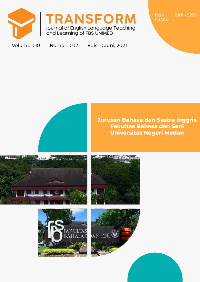Positive Politeness In œOn the Basis of Sex Movie
DOI:
https://doi.org/10.24114/tj.v10i2.43293Keywords:
Politeness Strategy, Positive Politeness, Forms of Positive PolitenessAbstract
This study aimed at analyzing the types of positive politeness strategy of the main character which represented in On the Basis of Sex movie. The descriptive qualitative method used to gain the findings of the data. The video recording used to gain transcription from the movie was the source of the data. From that findings, the data found were 90 utterances spoken by Ruth as the main character of the movie. And from those utterances, 29 represented as Positive Politeness which was 32,2%. The forms of positive politeness, Ruth represented 27 forms of positive politeness, with Question was the most dominant type of all with 8 amounts (29%), followed by Request 7 (26%), Disagreement with 6 (22%), Suggestion with 4 (15%) amount, and Rejection and Chasetisement shared 1 (4%). Thus, the writer found that positive politeness in the movie often emerged because the theme was about law school, court room, and national administration.Downloads
Published
2023-02-03
Issue
Section
Articles
License
Copyright (c) 2023 Aloyna Misje Perarihenta Karo-Karo, Elia Masa Gintings

This work is licensed under a Creative Commons Attribution-ShareAlike 4.0 International License.
Authors who publish with this journal agree with the following terms:
- Authors retain copyright and grant the journal right of first publication with the work simultaneously licensed under a Creative Commons Attribution License that allows others to share the work with an acknowledgment of the work's authorship and initial publication in this journal.
- Authors are able to enter into separate, additional contractual arrangements for the non-exclusive distribution of the journal's published version of the work (e.g., post it to an institutional repository or publish it in a book), with an acknowledgment of its initial publication in this journal.
- Authors are permitted and encouraged to post their work online (e.g., in institutional repositories or on their website) prior to and during the submission process, as it can lead to productive exchanges, as well as earlier and greater citation of published work (See The Effect of Open Access).
- This work is licensed under a Creative Commons Attribution-ShareAlike 4.0 International License.

This work is licensed under a Creative Commons Attribution-NonCommercial-ShareAlike 4.0 International License.



